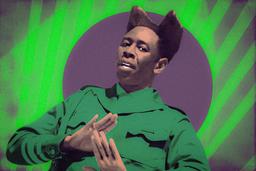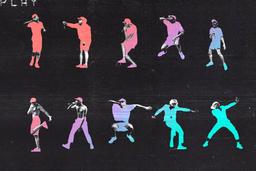What we have here is avowedly get-you-up-off-your-ass music. That’s spelled out from the start. “Number one,” says a cybernetic Tyler, the Creator, “body movement, no sitting still.” There are other tenets essential to his surprise eighth LP, Don’t Tap the Glass, but none take on the urgency of the preceding request. “Dancing driving running,” he added in a statement accompanying the record’s Monday release. “Any type of movement is recommended.” Brodie’s goal is to elicit a physiological reaction to the question posed by the honorable Bus-a-Bus on the song that the opener to this very album samples: “Don’t this shit make a n---a wanna jump?” That’s an age-old altar. You know what wise men have said about the connection between rear and mind.
This is another way of saying that my folks are a moving tribe, and I don’t mean nomadic. Folks of talking drums reborn on cloistered, bloody ships where they could glimpse fresh air only if they moved. “They are encouraged to dance in chains,” recalled one captain aboard a transatlantic vessel carrying the captive progenitors of hip-hop, “by the application of the whip.” I don’t know much about captivity, but I know that whatever motions arose from those ship decks were more a form of speaking than dancing on the part of those moving their feet.
And that dialogue didn’t start or end there.
It’s this background that Tyler, a child of multiple wings of the diaspora, wants to mine: Mmanwu, Juba, tap, swing, disco, breakdancing. Each one a variation of the same language, retrofitting the boundless expressions that a certain pattern of rhythm can evoke. A certain kind of groove.
This album is beyond and a part of that. Released with little buildup, on a seemingly routine Monday morning, Don’t Tap the Glass is a swaggering, swooning, gnarly romp. An economical, 30-minute affair, the record is his sparest narrative in at least a decade—possibly ever. Above all else, it’s a work that’s infatuated with movement, not just as a reactive motion but as a form of everlasting speech.
After an early career devoted to shock-rap pyrotechnics, the Inglewood-raised Creator has bloomed into a singular creative force in the post-streaming rap landscape. In the past decade, he’s made pollen-soft coming-of-age records (2017’s Flower Boy), kaleidoscopic elegies to unrequited love (2019’s Igor), passport-stamped lyrical marathons (Call Me If You Get Lost in 2021), and paranoid, marching-line-style reflections (Chromakopia, last October). Between 26 and 34, T won and lost Grammys, synthesized a nearly unrivaled level of critical acclaim and commercial success, and accomplished all of this with a regular output that stands in marked contrast to that of many of his peers. If there’s been a primary animating force behind all of these works, it’s that they’ve endeavored to balance uncommonly intimate introspection with particularly graceful bouts of self-acceptance. With each new drop, he’s managed to do this while honing an instrumental talent he’s always overflowed with—mastery of chord progressions, percussive layering, tactful repetition—in ways that mirror the generation of iconoclasts directly preceding him (think his idol, Pharrell, or Kanye or, to a different extent, Q-Tip).
Within T’s oeuvre, Don’t Tap the Glass stands out not only in its range but in its general looseness and oppositional nature. The first time I spun the album, what hooked me most about it was the griminess—how the album revels in popping out without indulging in the urge to balance this impulse with an equal and opposite reaction. On “Big Poe,” alongside a pseudonymous Pharrell, Tyler delivers his verse at a practical growl, crowing to a paramour about being “a sick pup” over vuvuzela drones. The sandpaper-rough, one-and-a-half-minute “Mommanem” (with its schoolyard taunts on the subject of who “gon’ get clipped today”) blends into its successor, “Stop Playing With Me”—a frenetic, boastful blitzkrieg, with a music video featuring Clipse and LeBron and insults ranging from “Fuck you and ya momma” to “Thank the gods I’m nothing like you” to the piquant “You’s a funky-ass bitch.” There are jaundiced MJ sclera references, chain-snatching fantasies, and Ozempic shaming on the album’s title track—to say nothing of when, later in the same song, Tyler tells any number of offended middle-aged detractors to go get “your prostate exam” with a Too Short–inflected exclamation.
On second play, though, I wondered whether our preeminent crooner had smuggled something more amorous within this packaging: the Urban Hang Suite vibes and unquenchable longing of “Ring Ring Ring,” the assured eroticism of “Don’t You Worry,” or the impressionistic vows that leave a streak of pastels all over “I’ll Take Care of You.” At one turn, Don’t Tap the Glass is a braggadocious barrage of lyrical one-upmanship—all vocader-funk-assisted claims of being “that guy” and Pharrell-assisted stunting about Parisian residencies. At the next, it transmutes into a collection of cheeky duets marked with pacts to “carpool” between the sheets and climax “at the same time.” (There are, seemingly, a trove of subliminals if you’re in the market for that kind of thing, too.) Listen to the record for long enough, and you’ll start to wonder whether it’s not any one of these things but all of them, everywhere, all at once. That’s not necessarily a new trick for Tyler, but to do it simultaneously in text and in texture feels like a clear progression for the producer-MC.
The inspirational palette is expansive: Kelis and Three Stacks interpolations stand next to peak Cherrelle and Alexander O’Neal and a healthy dose of the Quikster. Mid-’90s Memphis bounce flourishes a breath after ’80s New York electro-funk. The millennial maestro even manages to make a tender serenade—all blended hook and vibrating bass and escalating chords and intricate bridge—out of a “Knuck If You Buck” sample. Don’t Tap the Glass might not be T’s most consistently manicured body of work; he’s on the move and improvising, pulling from anything and everything he feels like. But it is his record most interested in bringing you along with him, clearing the floor for the listener to act out their mood as he puts in motion damn well all of his. That takes a certain fluency. You either speak it or you don’t. Is it a mixtape, an album, or merely a good time? On Don’t Tap the Glass, Tyler isn’t concerned with crafting a crowning achievement, only an activating one that’ll do like the rhyme and make his folks wanna jump.



